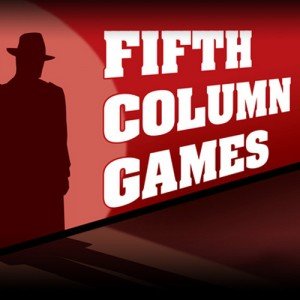New Gamer Nation had the opportunity to talk exclusively with Andrew Marsh, co-founder of San Francisco’s Fifth Column Games about the state of Facebook gaming, the future of the industry and the question of games as art. Take a look at the interview below and enjoy.
New Gamer Nation: Could you provide your job title and a general description of your role at Fifth Column?
AM: I’m the founder and President. I do a whole lot of different things including engineering, design, producing, and business development. I do a lot of “whatever isn’t going to get done by someone else”.
NGN: What drove you into games development? Was it something you intended to do? Were you a gamer before you began developing?
AM: I’ve been a gamer and a programmer my whole life. I wrote a lot of games for projects in school and I got a job as a console game engineer not long after I graduated. I’ve been doing this for as long as it’s been an option.
NGN: What particular challenges and opportunities are presented by developing for Facebook and why did you choose that platform for your games?
AM: I’m not all that picky about platforms; I just like making games. It’s fun to develop anything for anyone, although amounts may vary.
We’re in Facebook because we have a strong background in it and that’s the direction A+E Networks (our first game’s publisher) wanted to go when we started working with them. Technology is a big priority for us, so in the process we built a sophisticated flash engine and now we can make high quality flash games relatively quickly. Facebook will be part of our business model as long as it’s viable.
That said, we’re already branching into mobile and we’re always keeping an eye out for other platforms. Adam (CTO and founder), Mike (CCO and founder), and I all come from console games and we’re all engineers, so we feel pretty comfortable working in whatever platform makes the most sense.
As for Facebook itself, it’s a good platform that’s easy to develop for but has become saturated with competition and expensive to enter. I think it’ll be a viable business model for a long time and I look forward to staying in it, but it’s definitely not the no-brainer it was 5 years ago.
NGN: As you have a background in console development what are your expectations for the next generation of home systems, particularly the Wii U?
AM: I have a lot more faith in the console industry than most people do. They can be slow to react but the social game’s industry can’t touch their development and art chops. The console makers know what’s going on and they’re going to make some fundamental changes to their platforms.
The next generation isn’t going to be another round of beefier machines– we’re going to see a revolution in usability, community features, downloadable games, and payment model support. I’m not saying it will work though.
As for the Wii U, I don’t really think it is the “next generation” of consoles. I’m sure it will have some really fun games, but I can’t imagine it really making a dent in the new gaming movement. I think
Nintendo is going to run the risk of becoming irrelevant if they keep ignoring things like multiplayer, social features, downloadable games. But what do I know– I still think the 3DS was kind of dumb.
NGN: What is your assessment of the current publisher model? Do you believe that publishers done enough to adapt to emerging game markets and platforms?
AM: I love my publishers. The current model of working with them is perfect because they are perfect. To think otherwise is fallacy. To doubt is fallacy.
Honestly though, my experience with publishers is really positive, but I doubt it’s standard. I’ve worked with enormous companies but they still manage to have a flexible and passionate games department. For the most part, they hand us a brand, we pitch an idea, and if we get green lit, we get to make that game. Of course we do milestone reviews and talk a lot about design, but so far we’ve been given the space to do what we think is best.
Most publishers seem to adapt to emerging markets pretty quickly simply by picking partners who understand them. The worst thing I see is when a publisher decides to go with the lowest bid on a really high potential project and ends up throwing away a really good opportunity.
NGN: We’re seeing the emergence of small, even one person, viable developers for the first time in decades because of the emergence of new platforms. In the long term is this a trend that can continue or will costs and the publisher model restrict development to larger, established studios?
AM: The games industry goes in waves. Small teams need to stay way ahead in creativity to make up for their lack of polish and complexity. When there are large shifts in the space, like recently from console to social and casual, small teams can create a lot of interesting and fun games quickly.
Pretty soon after though, larger developers, aided by improvements in hardware and tools, are going to come in and raise the quality bar out of reach of the small teams.
If a platform has a high performance (e.g. console) a large developer can make incredibly high quality products that, even if they lack innovation, just blow the little guy out of the water.
If the performance is bad (e.g. web) then everyone has the same constraints and smaller developers can compete. Performance is the main reason mobile is still a fair game. As hardware gets better we’ll see better and better looking mobile games which will push out a lot of the smaller guys.
Also, bad development tools slow down quality and polish a lot more than they slow down innovation.
Of course, utilizing all that stuff takes decades of experience and a large and diverse team. One of the reasons the Facebook space was so accessible for so long is that web languages (Flash, HTML5, JavaScript…) were (read: are) so mediocre.
To break this cycle we’re going to need revolutions in tools, software, and education. Tool developers are going to need to learn to focus on making life easy for game developers.
We’re going to need easy to integrate tools for all the really time consuming and generic systems like persistent data storage, server scalability, rendering, 3D physics, level design, AI, and UI.
We’ve already seen a little of this with Flash, and it’s really raised the quality of an indie developer’s game, but there’s a long way to go– and a lot of the newer languages don’t have the same advantages.
NGN: In your opinion are games a form of art?
AM: Games are absolutely an art form. Games can be beautiful, aesthetic, emotional, expressive, engaging, and graceful; they can be significant. The issue isn’t if games are an art form, it is if there are any good art… and… no, not really.
The issue with games is that they are extraordinarily difficult to make. They require a unique combination of craft, creativity, math, and complexity management. They mix user experience with abstract concepts like fun and charm, and add in deep technical difficulty. They are interactive, they are complex, and they are expensive.
When we do create art, which we do from time to time, technology often swallows it. What should become a timeless classic becomes dated and unintuitive (see: Star Control 2). I can hardly be upset about progress but it does contribute to the problem.
Finally, I would say that we are currently experiencing a dark age in video games. We’re mired with commercialism and mediocrity. Metrics have replaced passion, addiction has replaced engagement, and imitation has replaced innovation. Success has little proportion to quality, and worst of all it’s working. We have more users and more money than ever before, and I don’t see everyone getting altruistic all at once. But, what do we expect. Video games are, what, 50 years old? We have a long way to go and that’s the way it’s supposed to be. Have you ever listened to a Gregorian Chant or seen a movie from the 20s? If those are art, then so is Dig Dug.
—–
New Gamer Nation would like to thank Andrew Marsh for his time and now we pass off the conversation to you, the audience. What do you think about the state of Facebook Gaming and the industry in general? Make sure to comment below and stay tuned to New Gamer Nation for more interview, reviews and gaming news!


